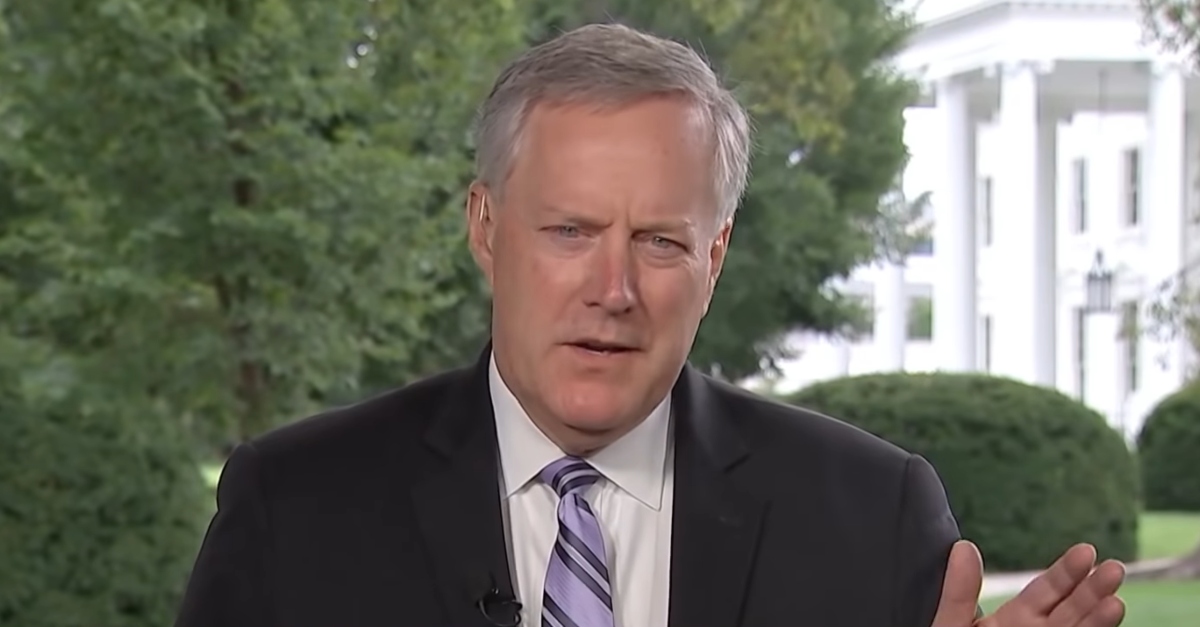
Mark Meadows
ABA Legal Fact Check debuted in August 2017 and is the first fact check website focusing exclusively on legal matters. This article has been republished with permission.
During the August Republican convention, with a lineup filled with top Cabinet officials and other Trump administration officials, White House Chief of Staff Mark Meadows shrugged off complaints that there were numerous violations of the Hatch Act, a law which limits political activities of federal employees. “Nobody outside of the Beltway really cares,” he told Politico.
“What it’s really designed to do,” Meadows said of the Hatch Act, “is to make sure people like myself and others do not use their political position to try to convince …other federal employees that they need to vote one way, need to register one way or need to campaign in one way.” Is Meadows correct in his interpretation of the law?
With the announcement that President Donald Trump would use the White House lawn to deliver his re-nomination acceptance speech on Aug. 27 during the Republican Convention, the Hatch Act was so frequently mentioned in news reports that retired Republican Sen. Orrin Hatch tweeted a day before, “Friends, I am not in charge of the Hatch Act please stop calling.”
The act itself dates to the presidential era of Franklin Delano Roosevelt, when Congress in 1939 codified civil service rules laid out three decades earlier in a presidential executive order. The directive prohibited employees from using their “official authority or influence for the purpose of interfering with an election or affecting the result thereof.” Years later, Sen. Carl Hatch, D-N.M., led the effort to turn the rules into federal law after employees in FDR’s New Deal Works Progress Administration engaged in congressional election campaigns.
In 1947, the U.S. Supreme Court ruled the Hatch Act constitutional, saying it balanced the rights of individuals to free speech with the “elemental need for order.” In 1973, the court upheld the provision of the law that banned federal employees from taking “an active part in political management or in political campaigns.”
“Congress and the President are responsible for an efficient public service,” the 6-3 ruling said in 1973. “If, in their judgment, efficiency may be best obtained by prohibiting active participation by classified employees in politics as party officers or workers, we see no constitutional objection.”
Congress significantly amended the law in 1993 to allow most federal employees to engage in a wide range of voluntary, partisan political activities in their free time, while away from the workplace. The law exempts the president and vice president from its provisions.
The U.S. Office of Special Counsel (no relation to the counsel of the same name that probed Russian interference in the 2016 election) investigates and subsequently determines violations of the Hatch Act for most civil service employees. The office (OSC) can recommend to the U.S. Merit Systems Protection Board, an independent, quasi-judicial agency in the executive branch, civil penalties that include suspension, removal and fines of up to $1,000 — but no jail time.
The OSC announced in October 2019, for instance, suspensions of two employees at the Defense Logistics Agency for violating the Hatch Act. The first individual received a 90-day suspension for sending partisan political emails and making political Facebook posts while at work; the second received a 30-day penalty for showing a “Vote Republican” image as part of a PowerPoint presentation.
The Hatch Act process for some political appointees, including Cabinet members and presidential advisors, is different. They are also barred from using their position to support or oppose a candidate or political party or using government funds to support their candidate. Like other government employees they are subject to punishment for violations of the law; but under the law, Hatch Act violations of presidential appointees “shall be presented to the President for appropriate action.”
During the Obama years, the OSC determined Kathleen Sebelius, the former secretary of health and human services, violated the Hatch Act in 2012 for comments before a gay rights group in which she expressed support for President Barack Obama’s reelection. In 2016, it found Julian Castro, then Obama’s secretary for housing and urban development, in violation of the law after saying in a media interview that he was taking “off his HUD hat for a second” to talk politics. The OSC said there wasn’t a clear-enough delineation between his private and public life. Both acknowledged their actions were improper and did not lose their jobs.
In the Trump years, perhaps the most prominent transgressions have been those of former presidential counselor Kellyanne Conway. “Since at least Feb.1, 2019, Ms. Conway has repeatedly violated the Hatch Act during her official media appearances by making statements directed at the success of your reelection campaign,” the OSC said in a June 2019 letter to President Trump. It recommended that she be fired.
“Blah, blah, blah,” Conway said a few weeks before the letter was released. “If you’re trying to silence me through the Hatch Act, it’s not going to work. Let me know when the jail sentence starts.” She was not removed and left the White House at the end of August for personal reasons.
More recently, in September, Democrats on the House Oversight Committee asked the OSC to investigate whether career employees “felt pressured to help organize” the appearances of Acting Homeland Security Secretary Chad Wolf and Secretary of State Mike Pompeo in videos at the GOP convention.
White House Chief of Staff Meadows did not correctly state the breadth of the Hatch Act as it applies to the political activities of the federal civil service workforce. While political appointees on the government clock are also subject to the Hatch Act, they seldom are punished because their fate is decided by the boss who appointed them.
Read more of ABA’s Legal Fact Check series here.
[Screengrab via CNBC]